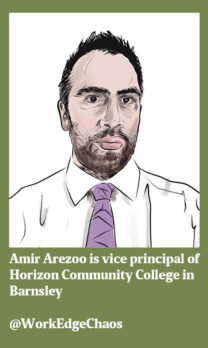The Things We All Forget
@ASTSupportAAli
Amjad Ali defines his notion of a mistake in clear terms, and it’s never a question of blame. Multiple factors are at play, “but ultimately we know when highlighted to it that an alternative way would have been better or more correct”. Indeed. Like Ali, I see a lot of lessons on a daily basis, and witnessing teachers make mistakes in lessons is tough because: a) most teachers will instantly know they’ve made an incorrect move, and b) they will stew on them for a long time. I read down the list of common mistakes that Ali sees and felt a little shame at how frequently I know I’ve committed those very mistakes in the past. Read this, and you’ll instantly tighten up your game on Monday morning.
Did I damage my own children by teaching them too early?
@iquirky_teacher
In the summer I took my daughter to see the Bayeux Tapestry. Although she might not have appreciated political conflict in the Early Middle Ages, she was mesmerised by what was on display. The Quirky Teacher, on the evidence of this post, would have been delighted to hear of my daughter’s experience. I couldn’t help agreeing with the author on many points, especially on the fallacious concept of “long-term emotional damage from being taught knowledge too early”. Whilst the works of Machiavelli and the basic principles of quantum mechanics will likely be too far (!), I am in absolute agreement that “hearing fun stories and good-quality adult conversation about the world and everything in it” is vital to helping a child make their way in the world. As for this statement: “Advantaged children are not miraculously more advanced or intelligent compared with disadvantaged children – they were given a leg-up at home and they certainly weren’t damaged because of it.” Abso-flaming-lutely.
Even reliable assessments can be biased
@daisychristo
As an interesting comparator to Ben Newmark’s post, Daisy Christodoulou makes the case that teachers are inherently biased in their assessment of pupils, demonstrating “that it is perfectly possible for two separate scores to be very highly correlated, but for one of them still to be significantly biased”. If this is the case, then obviously it is important that teachers and school leaders recognise it. The problem of correlation vs causation is a known logical fallacy, but in clear and simple terms Christodoulou – with an interesting thematic intersection with Newmark’s point – shows that even cold hard data (especially of the teacher-generated kind) needs to be taken with a big pinch of salt.
Why Methods?
@mathsjem
If you are thinking of writing a book on teaching, then give this post a read, and think carefully about the level of commitment. Jo Morgan talks us through the spark of an idea, its development and the investment of time required in writing a book. It requires fierce dedication and faith in the face of naysayers (as her anecdote of the post-conference workshop attests). She states that the drive to write the book stemmed from her assertion that “subject knowledge development was the most important CPD maths teachers could do”. I would say this is true for teachers of any subject. Whilst I worry about the number of education books being published with little to differentiate them, there is always room for those that serve subject-specific development.
Correction: We have removed the review for Ben Newmark’s ‘What does knowing your class mean’ as it wrongly stated the blog hasn’t reviewed the relevant data. We apologise for this error.













Your thoughts